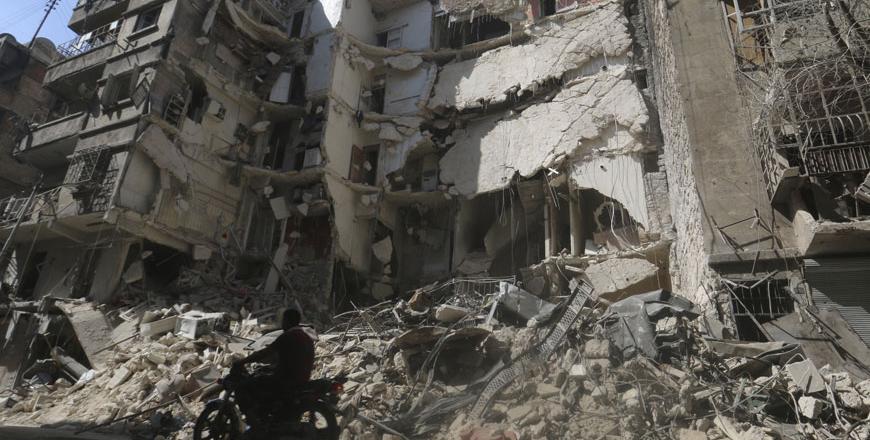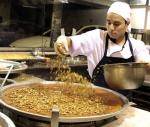You are here
Syria government to allow aid into starving town — UN
By AFP - Jan 07,2016 - Last updated at Jan 07,2016

A picture taken on May 6, 2012 shows a man walking in Madaya in front of a bus that travels between Madaya, Zabadani and Bloudan, three towns on the northwestern outskirts of the Syrian capital, Damascus (AFP photo)
DAMASCUS — Syria's government gave permission Thursday for UN aid deliveries to three besieged towns, including Madaya near Damascus where residents say people are starving to death.
"The UN welcomes today's approval from the government of Syria to access Madaya, Fuaa and Kafraya and is preparing to deliver humanitarian assistance in the coming days," a UN statement said.
It said there were "credible reports of people dying from starvation" in Madaya, including a 53-year-old man who reportedly died on Tuesday.
The three towns are part of a landmark six-month deal reached in September for an end to hostilities in those areas in exchange for humanitarian assistance.
Access to Madaya and nearby Zabadani had been restricted by pro-regime forces, while Fuaa and Kafraya, in northwest Syria, are surrounded by anti-government fighters.
"When the news broke out some people fired into the air to celebrate, but most are still waiting to see the food to believe it because they have been disappointed in the past," citizen journalist Maaz Al Qalamuni told AFP by telephone from Madaya.
The town last received humanitarian assistance in October but has since been inaccessible "despite numerous requests", according to the statement from the UN's Office for the Coordination of Humanitarian Affairs.
Around 40,000 people, mostly civilians, live in Madaya in Damascus province, many of them displaced from the neighbouring rebel stronghold of Zabadani.
At least 10 people have died there from a lack of food and medicine, according to the Syrian Observatory for Human Rights, a British-based monitoring group.
Growing outrage
Another 13 people who tried to escape in search of food have been killed when they stepped on landmines laid by regime forces or were shot by snipers, according to the observatory.
Aid deliveries are also expected to reach 20,000 people trapped in the Shiite towns of Fuaa and Kafraya, in northwestern Idlib province, OCHA said.
The deliveries are not expected to start for several days due to administrative delays, and certainly not before the weekend, which falls on Friday and Saturday in Syria, aid workers in the country said.
Foreign Minister Walid Muallem is expected to discuss the flow of aid during talks with UN envoy Staffan de Mistura, who is due to arrive on Saturday in Damascus on a new mission to organise peace talks between the regime and its opponents.
Outrage has been growing as images of what appear to be Madaya residents looking extremely frail after months of little food have spread on social media.
Pawel Krzysiek, a spokesman for the International Committee of the Red Cross who entered Madaya during the last aid delivery, also painted a bleak picture.
“People for far too long have been left without all the basics, basic food supplies, basic medicines, no electricity and no water... I really saw the hunger in the people’s eyes,” he recently told AFP.
“We’ve forgotten what bread tastes like,” 27-year-old Mohamed told AFP from Madaya this week.
“The situation has become very tragic,” he said.
The UN said that over the past year, only 10 per cent of its requested aid deliveries to hard-to-reach and besieged areas of Syria were approved and carried out.
Elsewhere in Syria, air strikes believed to have been carried out by Russian warplanes killed 10 civilians Thursday in the rebel bastion of Erbin east of Damascus, the observatory said.
Russia last year launched an air war on rebels battling the Syrian regime, which it backs.
More than 260,000 people have been killed since the Syrian conflict erupted in March 2011 and millions forced from their homes.
Related Articles
BEIRUT — A new ceasefire went into effect on Sunday between Syrian pro-government forces and Islamist rebels in three battleground districts
BEIRUT — Thousands of people will be evacuated from two besieged pro-regime towns in Syria in exchange for the release of prisoners held in
DAMASCUS — A 48-hour ceasefire came into effect Wednesday in the last rebel stronghold along Syria's border with Lebanon, a resident and mon












